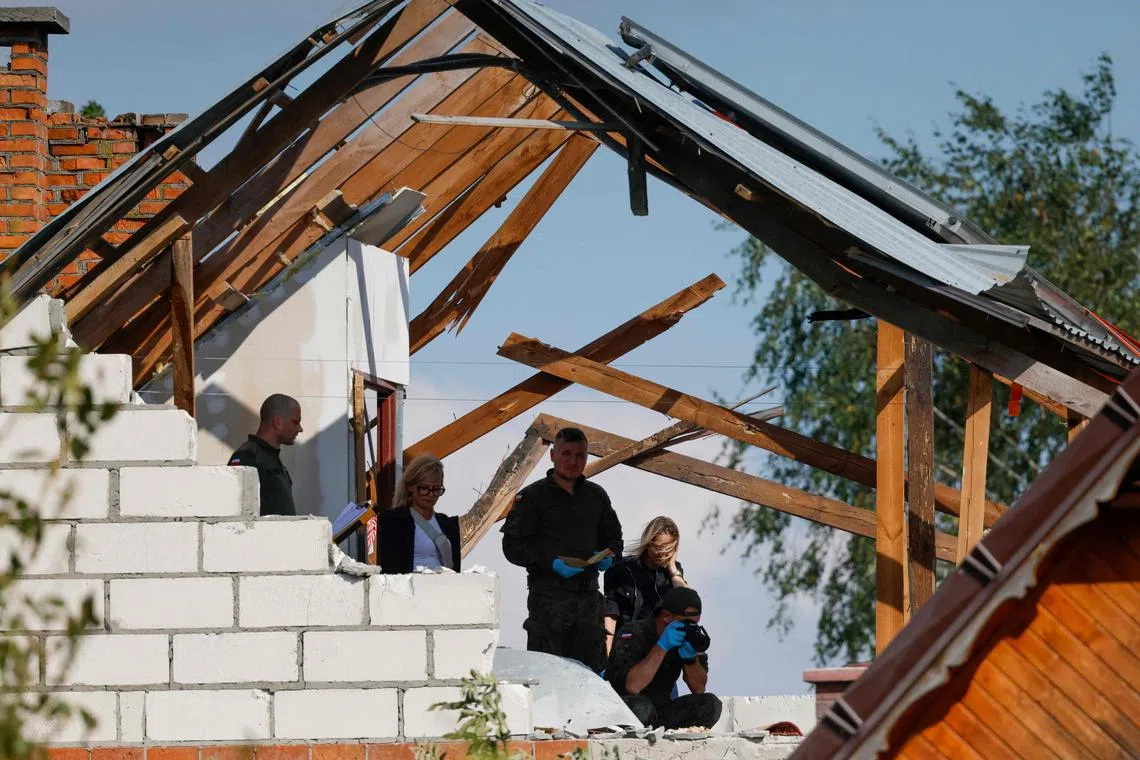Poland says Russian drone incursions could not have been a mistake, contradicting Trump
Sign up now: Get ST's newsletters delivered to your inbox

Police and army inspect damage to a house destroyed by debris from a shot down Russian drone in the village of Wyryki-Wola, eastern Poland, on Sept 10.
PHOTO: AFP
Follow topic:
WARSAW - Poland rejected on Sept 12 a suggestion by Mr Donald Trump that Russian drone incursions into its airspace could have been a mistake, a rare contradiction of the US President from one of Washington’s closest European allies.
Poland, backed by aircraft from other Nato countries, shot down drones that violated its airspace on Sept 10, the first time a member of the Western military alliance is known to have fired during Russia’s war in Ukraine.
Russia said its forces had been attacking Ukraine at the time and that it had not intended to hit any targets in Poland.
Mr Trump told reporters in Washington on Sept 11: “It could have been a mistake.”
But Polish Prime Minister Donald Tusk responded on social media platform X: “We would also wish that the drone attack on Poland was a mistake. But it wasn’t. And we know it.”
After strong condemnation of Russia by European leaders over the incident, Germany said it had extended air policing over Poland.
The UN Security Council was set to meet on Sept 12 at Poland’s request to discuss the incident. Nato called a press conference for 3pm GMT by its head, Mr Mark Rutte, and its top military official, Supreme Allied Commander Europe Alexus Grynkewich, who is a US Air Force general.
‘No question of mistake’
For Warsaw’s leadership to so directly contradict Mr Trump is almost unheard of, and a sign of Europe’s alarm at the US President’s willingness to give weight to Moscow’s account.
Poland is among the closest US allies in Europe. It has praised Mr Trump for calling for greater European military spending, and has been praised in turn by the Trump administration for devoting the largest share of its economy to defence of any Nato ally, including the US itself.
Polish Deputy Defence Minister Cezary Tomczyk said: “I think this is a message that should reach President Trump today: There’s no question of a mistake – this was a deliberate Russian attack.”
Warsaw has portrayed the drone incursions as an attempt by Russia to test the capabilities of Poland and Nato to respond. Polish Foreign Minister Radoslaw Sikorski was visiting Kyiv on Sept 12.
Questions about European defences
This week’s incident has raised questions about Nato’s preparedness for drone attacks and the security of Europe’s civil air transport.
European leaders say it is the latest demonstration that Moscow has no interest in a peace deal in Ukraine, weeks after Mr Trump hosted President Vladimir Putin in Alaska and withdrew a demand that Russia accept an immediate ceasefire.
Mr Trump has repeatedly set deadlines for Moscow to agree on a ceasefire or face new sanctions, only to row back.
European officials have been in Washington this week, hoping to coordinate sanctions on Russia with the US administration. Announcing such sanctions in tandem was previously standard practice but has not taken place since Mr Trump returned to office.
European Union member states agreed on Sept 12 to a regular six-month extension to their existing list of travel bans and freezes on the bank accounts of people and firms over the Russian invasion.
Kremlin spokesman Dmitry Peskov on Sept 12 said peace negotiations were on pause and that “the Europeans are hindering this” peace process.
France said the Russian ambassador would be summoned on Sept 12. On Sept 11, Paris said it would deploy three Rafale fighter jets to help Poland protect its airspace and Germany said it would strengthen its commitment to Nato’s eastern border.
Japan said it had decided to lower its price cap on Russian crude oil to punish Moscow for its continued war in Ukraine.
Russian attacks and Ukrainian drone strikes
Russia and its close ally Belarus began a long-planned joint military exercise on Sept 12 involving drills in both countries and in the Baltic and Barents seas.
Dismissing concerns abroad about the exercise, Mr Peskov said Western European countries were suffering “emotional overload” and that Russia did not pose a threat to them.
Russia also pressed on with attacks on Ukraine, killing three people in the northern Ukrainian region of Sumy, local Ukrainian prosecutors said.
Ukrainian drones attacked Russia’s north-western port of Primorsk, setting fire to a vessel and a pumping station, the regional governor said. It was the first reported drone strike on one of the country’s largest oil and fuel export terminals. REUTERS

